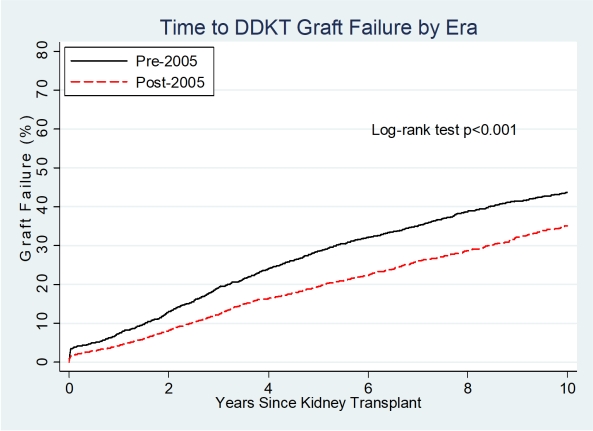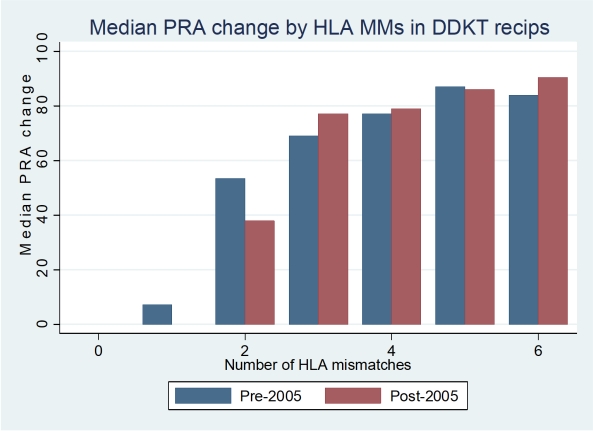Temporal Changes in Impact of HLA Mismatch among Pediatric Kidney Transplant Recipients
Johns Hopkins University School of Medicine, Baltimore, MD.
Meeting: 2018 American Transplant Congress
Abstract number: B89
Keywords: HLA matching, Kidney transplantation, Pediatric
Session Information
Session Name: Poster Session B: Kidney Deceased Donor Allocation
Session Type: Poster Session
Date: Sunday, June 3, 2018
Session Time: 6:00pm-7:00pm
 Presentation Time: 6:00pm-7:00pm
Presentation Time: 6:00pm-7:00pm
Location: Hall 4EF
U.S. pediatric deceased-donor kidney transplantation (pDDKT) allocation now deemphasizes HLA matching to improve equality in access to transplantation, but other national systems still consider HLA matching due to concerns about graft survival. We hypothesized that increased HLA mismatching in U.S. pDDKT negatively affected transplant outcomes.
Methods: Using SRTR, we explored changes in outcomes between first-time pDDKT recipients from two eras: 1995-2004 (N=2,854) and 2005-2014 (N=4,643). We used multivariable Cox regression to analyze the association between number of HLA mismatches and time to graft failure and, among recipients whose allografts failed, retransplantation. We tested for changes in the significance of number of HLA mismatches between eras using interaction term analysis. We analyzed the association between number of mismatches and PRA change at relisting using rank-sum tests.
Results: Post-2005, the median number of mismatches increased from 4 to 5 (p<0.001). The association between number of HLA mismatches and graft failure was similar in both eras (p=0.6). Overall, graft failure risk was 36% (95% CI 3-80%) higher with 1-3 mismatches and 45% (11-90%) higher with 4-6 mismatches than with 0 mismatches. Among recipients whose grafts failed, median PRA change increased from 79 to 85 (p=0.01), but PRA change for a given number of HLA mismatches was similar between eras (interaction 1-3 mismatches: p=0.4, 4-6 mismatches: p=0.6). Time from relisting to retransplant was longer for recipients with more mismatches at first KT pre-2005 (p=0.003), but not post-2005 (p=0.8).
Conclusions: Deemphasizing pDDKT HLA matching in the U.S. did not compromise graft survival or access to retransplantation. However, sensitization at relisting remains a problem and should be monitored for long-term effects on retransplant outcomes.
CITATION INFORMATION: Ruck J., Massie A., Desai N., Segev D., Garonzik-Wang J. Temporal Changes in Impact of HLA Mismatch among Pediatric Kidney Transplant Recipients Am J Transplant. 2017;17 (suppl 3).
To cite this abstract in AMA style:
Ruck J, Massie A, Desai N, Segev D, Garonzik-Wang J. Temporal Changes in Impact of HLA Mismatch among Pediatric Kidney Transplant Recipients [abstract]. https://atcmeetingabstracts.com/abstract/temporal-changes-in-impact-of-hla-mismatch-among-pediatric-kidney-transplant-recipients/. Accessed July 5, 2025.« Back to 2018 American Transplant Congress


